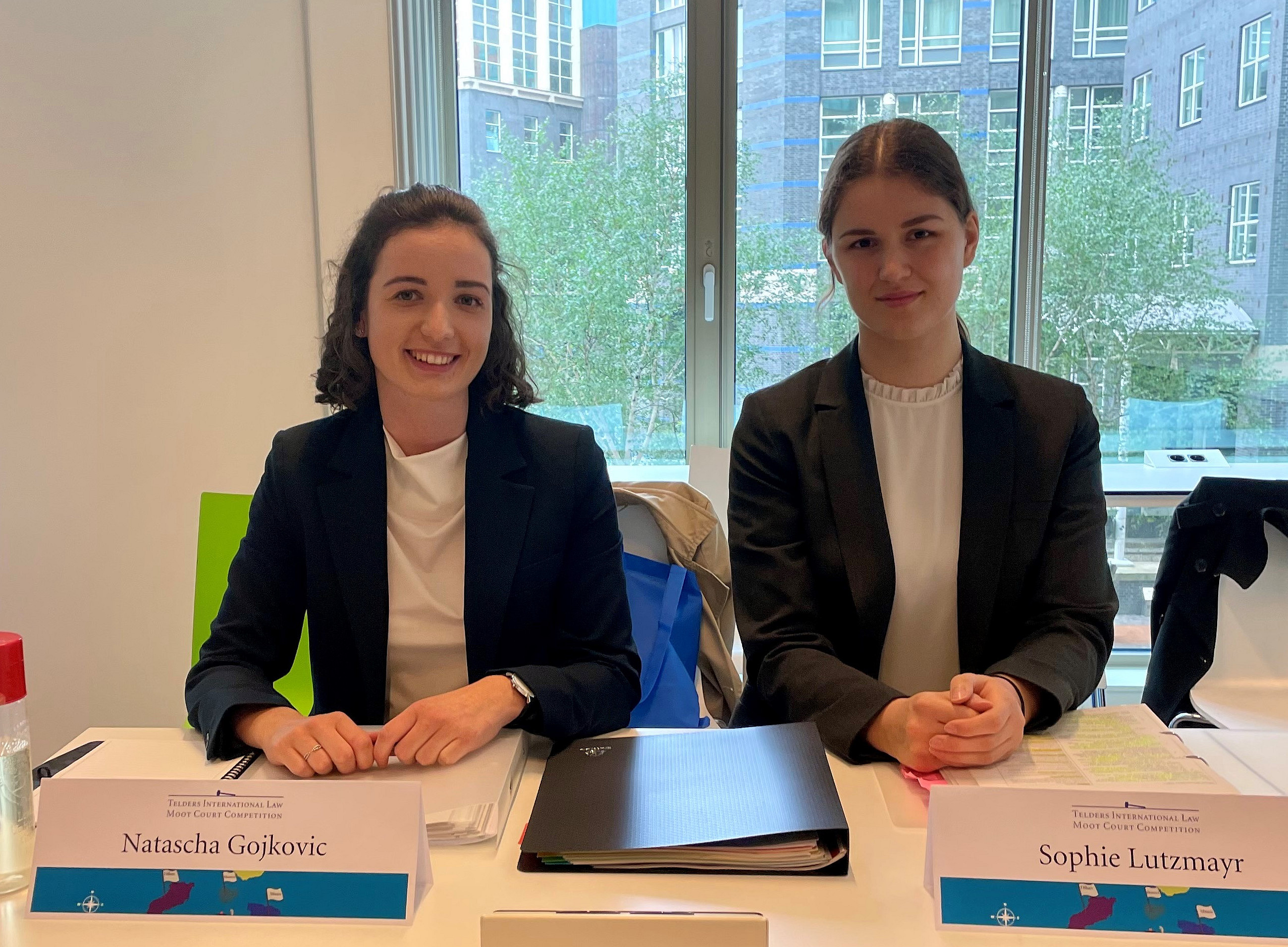Throughout the study year 2023/24, we, Sophie Lutzmayr and Natascha Gojkovic, had the honour and the privilege to represent REWI Uni Graz at the 47th Telders International Law Moot Court Competition. In this competition, students are given the unique opportunity to gain an insight into the practice of the International Court of Justice (ICJ) in The Hague and to take part in a simulated ICJ court hearing based on a fictitious case. This Moot Court honours the legacy of Prof. Benjamin Marius Telders, an international law professor at Leiden University who was interned for standing up for his belief in the rule of law and civil society and died at the Bergen-Belsen concentration camp in 1945. Annually, a fictional case is released, with two to four law students representing the involved parties before the ICJ through both written memorials and oral pleadings. In this year’s edition, 27 teams participated in the final rounds of the Telders Moot Court Competition.
The University of Graz supports participants by offering specialized classes which guide students both through the process of drafting of their memorials, as well as the preparations for the oral rounds. Despite being a comparatively small team of two, my colleague and I decided to take on this opportunity to participate in the 47th edition of this competition to improve our knowledge of international law and our rhetorical abilities.
This year’s case revolves around the fictional Island of Hemret, who first belonged to the Republic of Dihav, before a third party, Lihar, separated it from Dihav. It deals with the question which rights and claims both the Republic of Dihav and the Republic of Misan have within Hemret’s maritime zones, triggered by Misan sending submarines to Hemret’s waters. Ultimately, Misan launches a cyber-attack on Dihav’s key infrastructure, which leads Dihav to initiate proceedings in front of the ICJ as well as filing a request for provisional measures. Thus, a great variety of international law issues were addressed in the case: from provisional measures to preliminary issues of jurisdiction and admissibility, and further on to questions of colonization, the law of the sea, the use of force, countermeasures, and cyber-attacks in the context of international law.
The competition took place from October 2023 until the end of May 2024, being split up into a written and an oral round. Before the case was released in November, we already participated in a pre-moot workshop in Budapest together with the teams from Budapest and Düsseldorf, gaining first experiences with researching a case and presenting our arguments. Then, we drafted our written submissions until the beginning of March, delving deeply into the intricate issues of the case and familiarizing ourselves with the most important legal sources of international law and the jurisprudence of the ICJ. Each of us wrote 25 pages of submissions for each of the two parties, the Republic of Dihav as the Applicant and the Republic of Misan as the Respondent.
After handing in our submissions in the beginning of March, we turned our attention to the 40-minute oral pleadings for each party, each including a rebuttal or surrebuttal. While being regularly drilled with challenging questions by our coaches, Erika de Wet, Anna Lena Hörzer, and Christina Seewald, as well as by many other guest judges, we further improved our knowledge of international law, practiced our pleadings and time management, and learned to answer questions spontaneously. Furthermore, we trained our rhetoric skills with coach Monika Schmidt. Luckily, there were no regional rounds, gifting us with the opportunity to head to The Hague directly. Before the finals, we had the chance to participate both in another pre-moot in Düsseldorf with the Düsseldorf team, as well as in the International Friendly Rounds in Seville, where we ended up ranking best Oralist as well as third best Oralist and third best team.
Finally, after three months of practicing our pleadings, the finals in The Hague arrived. Representing both the Applicant and the Respondent side, we participated in four oral pleading sessions in the course of two days. The hard work paid off: In the Oral Rounds, we made it into the top ten of all teams on both sides: Despite being only a team of two, we ranked 5th place on the Applicant side and 9th place on the Respondent side. Furthermore, Natascha Gojkovic reached 22nd place in the ranking of the best speakers. In the overall rankings, we ranked 15th place, with 11th place on the side of the Applicant, missing the top ten by mere inches.
Throughout the year, we did not only immensely improve our knowledge of international law and how to structure legal arguments, but also gained insightful experience as public speakers. We learned to defend our arguments in the face of critical questions and gained confidence in our ability to persuade. Most of all, we had the chance to form new friendships and connect with other international law students from all over Europe. We are also immensely grateful for the support of our coaches, who believed in us and guided us along the way.
Now, the Telders Moot Court has come to an end. It is time for us to lean back and reflect on all the impressions and experiences we had. And, of course, to look forward to watching a new team emerge and grow, just as we have.
Find out more about the Telders Moot Court here and check out our Instagram account for many more impressions of our journey to The Hague!
